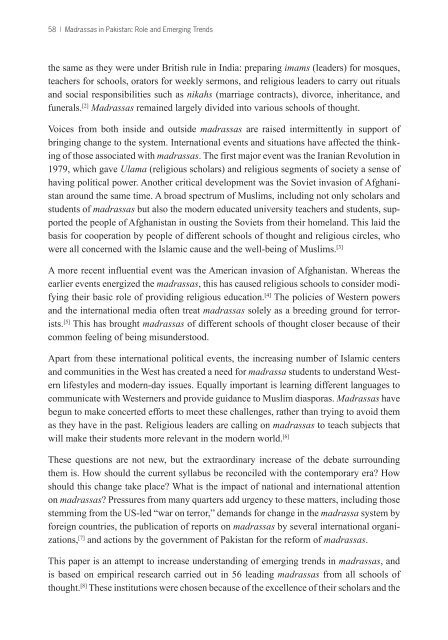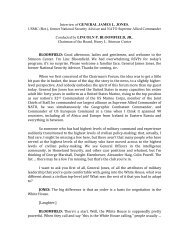Islam and Politics - The Stimson Center
Islam and Politics - The Stimson Center
Islam and Politics - The Stimson Center
You also want an ePaper? Increase the reach of your titles
YUMPU automatically turns print PDFs into web optimized ePapers that Google loves.
58 | Madrassas in Pakistan: Role <strong>and</strong> Emerging Trends<br />
the same as they were under British rule in India: preparing imams (leaders) for mosques,<br />
teachers for schools, orators for weekly sermons, <strong>and</strong> religious leaders to carry out rituals<br />
<strong>and</strong> social responsibilities such as nikahs (marriage contracts), divorce, inheritance, <strong>and</strong><br />
funerals. [2] Madrassas remained largely divided into various schools of thought.<br />
Voices from both inside <strong>and</strong> outside madrassas are raised intermittently in support of<br />
bringing change to the system. International events <strong>and</strong> situations have affected the thinking<br />
of those associated with madrassas. <strong>The</strong> first major event was the Iranian Revolution in<br />
1979, which gave Ulama (religious scholars) <strong>and</strong> religious segments of society a sense of<br />
having political power. Another critical development was the Soviet invasion of Afghanistan<br />
around the same time. A broad spectrum of Muslims, including not only scholars <strong>and</strong><br />
students of madrassas but also the modern educated university teachers <strong>and</strong> students, supported<br />
the people of Afghanistan in ousting the Soviets from their homel<strong>and</strong>. This laid the<br />
basis for cooperation by people of different schools of thought <strong>and</strong> religious circles, who<br />
were all concerned with the <strong>Islam</strong>ic cause <strong>and</strong> the well-being of Muslims. [3]<br />
A more recent influential event was the American invasion of Afghanistan. Whereas the<br />
earlier events energized the madrassas, this has caused religious schools to consider modifying<br />
their basic role of providing religious education. [4] <strong>The</strong> policies of Western powers<br />
<strong>and</strong> the international media often treat madrassas solely as a breeding ground for terrorists.<br />
[5] This has brought madrassas of different schools of thought closer because of their<br />
common feeling of being misunderstood.<br />
Apart from these international political events, the increasing number of <strong>Islam</strong>ic centers<br />
<strong>and</strong> communities in the West has created a need for madrassa students to underst<strong>and</strong> Western<br />
lifestyles <strong>and</strong> modern-day issues. Equally important is learning different languages to<br />
communicate with Westerners <strong>and</strong> provide guidance to Muslim diasporas. Madrassas have<br />
begun to make concerted efforts to meet these challenges, rather than trying to avoid them<br />
as they have in the past. Religious leaders are calling on madrassas to teach subjects that<br />
will make their students more relevant in the modern world. [6]<br />
<strong>The</strong>se questions are not new, but the extraordinary increase of the debate surrounding<br />
them is. How should the current syllabus be reconciled with the contemporary era? How<br />
should this change take place? What is the impact of national <strong>and</strong> international attention<br />
on madrassas? Pressures from many quarters add urgency to these matters, including those<br />
stemming from the US-led “war on terror,” dem<strong>and</strong>s for change in the madrassa system by<br />
foreign countries, the publication of reports on madrassas by several international organizations,<br />
[7] <strong>and</strong> actions by the government of Pakistan for the reform of madrassas.<br />
This paper is an attempt to increase underst<strong>and</strong>ing of emerging trends in madrassas, <strong>and</strong><br />
is based on empirical research carried out in 56 leading madrassas from all schools of<br />
thought. [8] <strong>The</strong>se institutions were chosen because of the excellence of their scholars <strong>and</strong> the

















